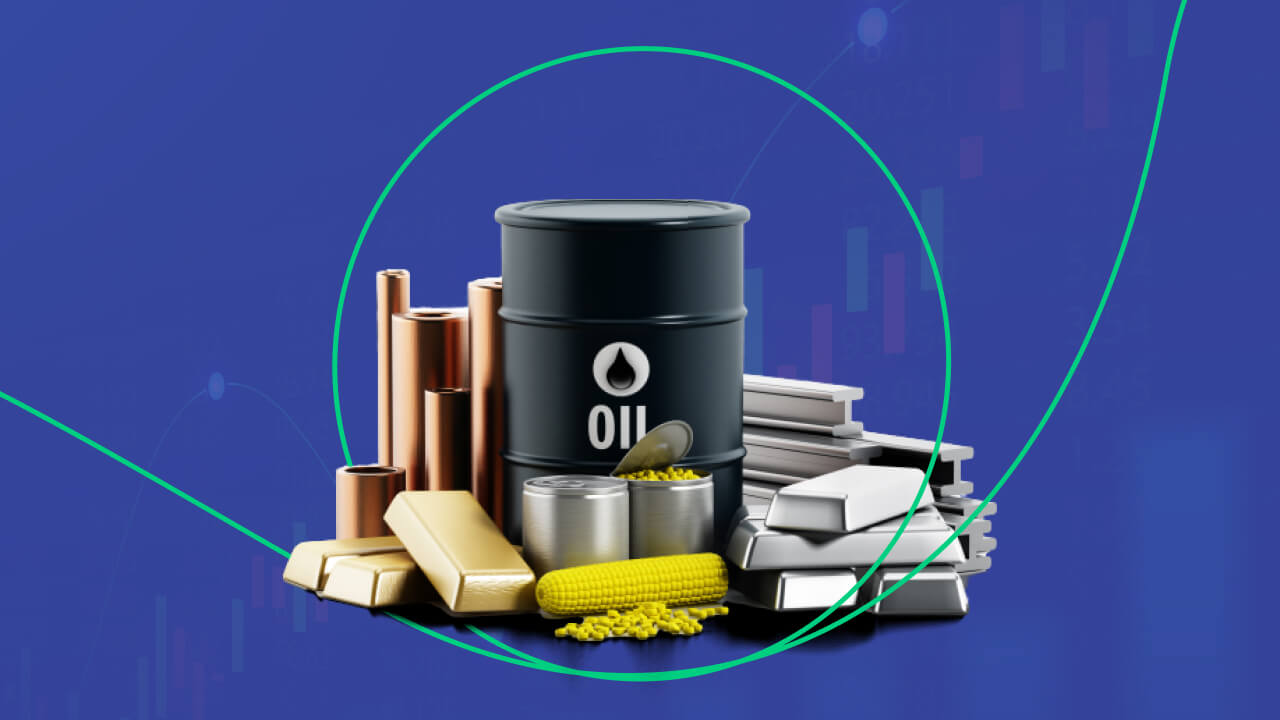Trading with commodities like Precious Metals and Oil can help in diversifying your investments and hedge against inflation. The commodity market is a rather volatile one, which can open the door to higher profits.
Trading commodities, especially through CFDs, can give you high leverage since you do not need to invest the entire cost of the commodity to trade them. Instead, you only need to invest 5-10% of the total price to start.
When done right, commodity trading can give you strong returns. But investing in commodities requires you to know more specialized knowledge about them.
What are commodities?
Commodities are mainly raw materials that are used around the world to produce finished goods. Any kind of natural resource used by individuals or companies for manufacturing or consumption purposes, including minerals, agricultural products, and fossil fuels are commodities.
What are the types of commodities?
Metals
You can trade metals like Platinum, Gold, Silver, and Copper. Investing in precious metals, especially Gold, during a volatile market is a sound decision. That’s because Gold has always given marginally higher returns in the long term.
Energy
Energy commodities include heating oil, natural gas, gasoline, and crude oil. Oil is considered one of the most important commodities all over the world. And, its soaring prices only make it more practical to trade.
For example, you buy Oil through CFDs at a price of $100 and hold it for a month until it becomes $120. You can then sell it a month later to gain $20 straightaway. You can also hold your position for a longer time to further maximize your returns.
The demand for energy resources has also skyrocketed in the past few decades, making the energy market a good trading arena.
Agriculture
Agriculture commodities include all agricultural products like wheat, soybeans, corn, rice, sugar, cotton, and cocoa. Agricultural items are the biggest necessity that people need to survive. Hence, it also acts as a hedge against inflation because when the economy witnesses inflation, the prices of agricultural commodities are the first to increase.
What are the ways to trade commodities?
1. Futures
When you trade commodities through futures, you sign a future contract agreement to either sell or buy a commodity on a pre-decided date. The commodities are then traded against the US Dollar in the futures market using CFDs.
Let's say, you buy 100 Oil barrels for $50 over a 30-day futures contract. After 30 days, you would close the contract by selling the 100 barrels you bought at the previous price. If the closing price is higher than your opening price, you make a profit. Otherwise, you would be at a loss.
This gives you the opportunity of benefitting from the fluctuating prices of the commodities, without actually purchasing or selling the underlying products.
2. Exchange-traded Funds
When you trade commodities through exchange-traded funds (ETFs), you do not have to own the physical asset but only the contracts which are backed by the commodity. These are low costs, highly liquid, and readily accessible since they combine money from numerous small investors to build a large portfolio. A great example of an ETF is an energy mutual fund based on several energy commodities.
3. Contract For Differences (CFDs)
Contract for difference (CFDs) is one of the popular ways to trade commodities like Crude Oil, Silver, Gold, and Platinum. Trading commodities through CFDs give you the highest possible leverage as you only need to invest at most 10% of the total commodity price.
This is a way to profit from both falling and rising prices by speculating on the commodity’s price movements without taking actual ownership. You can profit from a falling market by short selling a commodity position and alternatively, you can profit from a rising market by going long.
Start trading commodities through CFDs today
Commodities are a great investment opportunity especially for experienced traders looking to enter a new market. Blueberry Markets allow you to trade in more than five different commodities against the US Dollar. These include West Texas Intermediate, Brent Crude Oil, Silver, Gold, and Platinum. If you have been planning to get a head start in commodity trading, we can make the beginning of your process as easy as clicking a few buttons.
Frequently Asked Questions
How do I trade energy commodities?
You can trade energy commodities through CFDs and other funds as it allows you to invest with less capital and still gain high profits. It's possible to trade energy commodities like electricity, natural gas, crude oil, wind power, and more.
Which commodity is best for trading?
While almost all commodities are great for trading, crude oil is one of the best commodities to trade. This is because it consists of organic materials that are highly valued in the market. Crude oil prices rarely experience a huge long-term dip in the market.
Which is better to trade? Forex or commodities?
Forex and commodity trading are both beneficial in their own ways. The Forex market definitely has higher leverage. This makes it a better trade option compared to commodities. However, commodities have seasonal patterns easily predicted by economists and analysts. They are also tracked with lower transaction costs, making them a suitable choice.
Disclaimer: All material published on our website is intended for informational purposes only and should not be considered personal advice or recommendation. As margin FX/CFDs are highly leveraged products, your gains and losses are magnified, and you could lose substantially more than your initial deposit. Investing in margin FX/CFDs does not give you any entitlements or rights to the underlying assets (e.g. the right to receive dividend payments). CFDs carry a high risk of investment loss.




